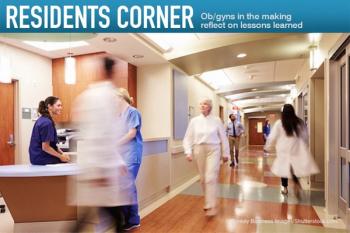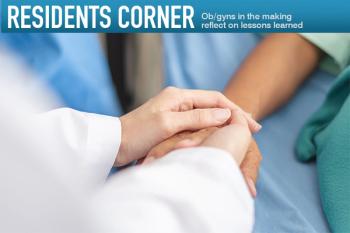
- Vol 64 No 05
- Volume 64
- Issue 06
Fighting back with love
When an ob/gyn treats young patients exposed to cruelty and confusing messages, it can be tough to overcome anger at the situation.
My 12-year-old patient was sitting alone in the exam room when I walked in. Eyes on her phone, she was engrossed in a video of a girl about her age in the middle of a long rant. We listened together to the girl’s tirade against everything from her parents to her school to her boyfriend to pop culture stars. “She seems pretty angry,” I said, to which my patient replied that she knew the girl well and her videos sometimes went on for hours.
In life and in my work, I try to focus on “finding the funny”-the parts of a day that make me laugh. In pediatric gynecology, there are a lot of really great, hilarious moments. A mom reports a “Crayola Seafoam Green” discharge from her child’s vagina, into which the girl had placed a crayon. A laugh-cry moment when a patient sobs to me that her grandmother was given a diagnosis of cancer and “has only 30 or 40 more years to live.” And then there are the nicknames that my patients use to refer to the vulva and vagina. When I first meet them, I try to use their words and hear myself saying hoo-haw.
But some days, the humor is hard to find, and I feel like I want to make a rant video myself. In gynecology, we’re constantly navigating a world that, at best, sends mixed messages to our girls about their worth as human beings, and at worst can feel like a constant assault. In trying to be emotionally present for every patient, we talk easily about sadness or joy. It’s less easy to acknowledge that anger can co-exist with these feelings, maybe because discussing anger means having to discuss its complicated roots.
Roots of anger
My patient with the friend who makes the angry videos has a lot to be angry about herself. I met her in the Emergency Room when she was
11 years old and came in with heavy vaginal bleeding from a molar pregnancy. There was no fetus, but a molar pregnancy starts like any other, with sperm. She had been raped. Afterwards, I could find no 11-year-old-appropriate words to describe the abnormal pregnancy to her, to reassure her when she asked me the difference between an abortion and the procedure that she had undergone to remove the tissue from inside her uterus, to explain that the abnormal pregnancy tissue can linger in the body even after treatment, and can return and become like a cancer, requiring months of laboratory monitoring. She was transferred into foster care shortly after discharge from the hospital. When the girl missed one of her lab checks, our social worker learned that she had run away with an older boyfriend. For a brief time, she was sought by the police, and she was eventually found and placed in a locked-down care facility. As far as I know, her rapists have never been locked down, have never been in the hospital undergoing a procedure they didn’t understand, and have never felt the prick of a blood draw every week, then every month.
It seems natural and justified to feel angry for my patients who are in difficult situations borne of violence. When the difficult situation is borne of love, my anger feels less natural and justified, my values more suspect, my role less clear. For example, we cared for a 17-year-old woman who has had multiple major surgeries for a severe congenital reproductive tract malformation. Health-wise, she’s currently doing very well. A member of a religious sect in which marriages are arranged, she is nearing the age of marriage. Her parents and the leader of the sect, all loving people devoted to her happiness, recently had a conference call with the gynecology team. The patient was not on the call, but it was done with her knowledge and permission. The parents and the religious leader requested a formal letter describing in detail the woman’s fertility potential and said that an inability to carry a pregnancy would make my patient potentially un-marriageable. Her fertility potential is meager, and I felt frustrated at the circumstances and at what we were being asked to do. I was lucky to have an amazing attending to talk to about my anger in private. That conversation allowed me to examine my values, find a space where my anger was welcomed-and recognize where it was not-and to grow as a physician.
Facing anger
It can become overwhelming. I’m angry at myths about hymens, and the widespread belief that a pelvic exam or using tampons will break one. At misinformation about what the vulva should look like, so my patients feel uncomfortable about their bodies, unsure who to ask if they are normal. At restrictions on birth control access and insurance coverage, so that my patients can’t all use the medications they need for their painful periods, heavy bleeding, acne, cancer prevention-or yes, for contraception. I am angry about the never-ending stories of sexual abuse and sexual pressure, and the meager number of girls who have access to counseling to help them heal. Add to this a health care system that under-prioritizes the female body. For example, there are operative reports for young girls who have had major urinary and bowel surgeries that don’t mention the vagina and uterus. Girls with menses so heavy they necessitate blood transfusion, yet whose previous providers noted nothing abnormal about their menstrual flow, or maybe didn’t ask. And there are preschoolers treated over and over for yeast infections, even though it’s extremely rare for a yeast infection to occur at that age.
It’s confusing and tragic and it hurts, then it feels unreal, then routine, then almost inevitable (or worse, almost normal). In the #MeToo era, acknowledging anger seems healthy and constructive, but it doesn’t end there. We can move from anger to support to empowerment.
Fighting back
Our patients show us how to travel this arc, and what it means to support women. This can be most apparent in situations that challenge traditional ideas of womanhood. One of my patients, amenorrheic at age 15, was found to carry an XY genotype. She laughed as she said that when she tried to tell her friends about her karyotype, they thought she was transgender and planning to transition, “and they were so supportive!” (They were still supportive after they learned she was not transitioning). Another patient, a 21-year-old married woman with vaginal cancer, could not have intercourse without bleeding and severe pain. At her request, and with her husband present and participating in the conversation, we discussed other ways they could safely be intimate. The mother of a 2-month-old expected to undergo a bone marrow transplant for a rare genetic disorder met with her gynecologist because the chemotherapy required for the transplant had a high risk of causing her ovaries to stop functioning. This mother was entirely alone, having moved to our city to seek care for her baby, and was staying in the Ronald McDonald house. I marveled at the woman’s strength as she tried to peer into a future that she wasn’t certain would exist for her baby, and how, through it all, she was so appreciative that our medical team was discussing this aspect of her daughter’s health. In addition, she had found a network of supportive parents online that she could talk to openly about fertility, who supported and loved her, and made her feel that she didn’t have to make this decision alone.
In light of how these conversations could have gone for my patients, these stories seem like more than expressions of love: they seem like fighting back.
We work in a job where difficult conversations about sex and fertility occur every day, and serve as guides in a world of conflicting messages where we don’t always know the way ourselves. It’s okay to be angry at how our patients struggle, at the systems around us, at ourselves-make a rant video, write an article, shout it in the streets! Then do what our patients do: fight back with love.
Attention residents!
Are you a current intern or resident and interested in writing about your experiences?
Email
Articles in this issue
over 6 years ago
The importance of intervention: When was this baby in trouble?over 6 years ago
How to optimize imaging in the obese gravidaover 6 years ago
Pruritus, pain and fissures in a 65-year-old womanover 6 years ago
Antibiotic prophylaxis and operative vaginal deliveryover 6 years ago
Barriers to abortion training in ob/gyn residencyNewsletter
Get the latest clinical updates, case studies, and expert commentary in obstetric and gynecologic care. Sign up now to stay informed.









